Ethiopia in Four Days: Discovering a Culture of Pride and Pain
Posted on 28 February 2018
In 2017, ABURY started to work with a fair trade cooperative of weavers, called Sabahar, in Ethiopia. Learning more about the conditions of the weavers and their families from afar, we decided to base the next PortrAid project of the ABURY Foundation as well in Ethiopia and support the weavers of Sabahar with (new) looms – and therefore better working opportunities.
So, on a cold day in November, I boarded a plane to go to Addis Ababa - the capital of Ethiopia, to meet the weavers and take their portraits, together with Alicia, the project manager of the ABURY Foundation, Thomas, my co-founder of PortrAid and Xiomara, our photographer in this project.
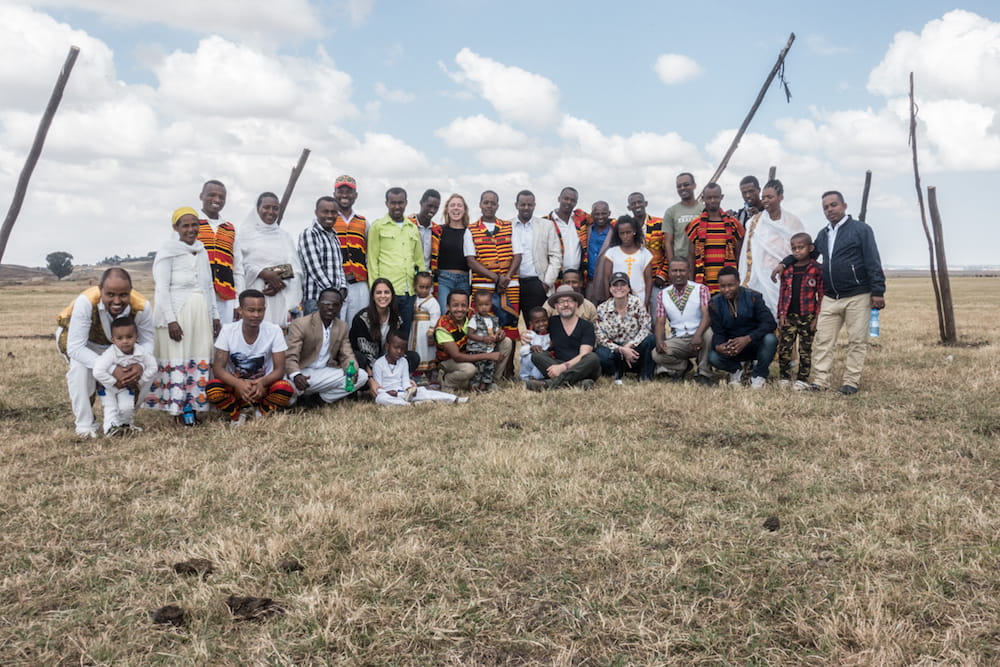 © 2017 PortrAid / Thomas Rusch
© 2017 PortrAid / Thomas Rusch
Ethiopia: More than Drought, Famine and Coffee?
It is always an adventure to go to a new country. I had not been to Ethiopia before. My knowledge about it was quite basic. Drought, famine and coffee are three words that immediately come to one’s mind thinking of Ethiopia. And then obviously Haile Selassie, the last emperor of Ethiopia who is a messianic figure for the Rastafari movement - he died in 1975. Some more facts I took with me from the Google research: With over 102 Mio. people, Ethiopia is the second biggest country in Africa. What many people don’t know is that Ethiopia over the last decade is one of the fastest growing economies in the world but still has one of the smallest BIP per capita. It is still one of the world’s poorest countries and around half of its 72 million people live on less than one dollar a day. But now it was on us to discover a part of this country ourselves, to meet its people and their stories.
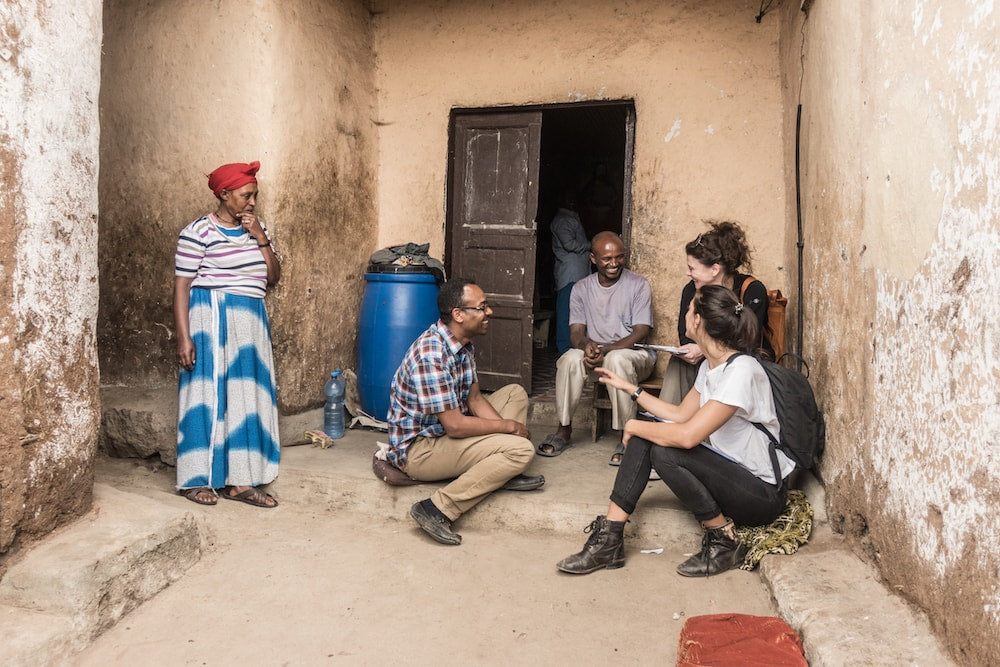 © 2017 PortrAid / Thomas Rusch
© 2017 PortrAid / Thomas Rusch
Coffee and Personal Stories: Diving right in
We arrived in Addis Ababa very early in the morning and the airport was already buzzing. To dive directly in the Ethiopia mode we sat down with the locals on the parking lot and had some hand-brewed strong (!) coffee and delicious local pastries while the sun was rising. After a fun drive with our talkative guide we arrived at Sabahar, just on the outskirts of Addis Ababa. On this first day we wanted to explore the area and meet the first weavers.
The friendliness, openness and hospitality of everyone we met was heartwarming - and juxtaposed shocking stories of personal hardship and great poverty. Only a ten minute ride from Sabahar, we entered an area in which around 100.000 people lived in what we would call „slum“ - they call it „China camp“.
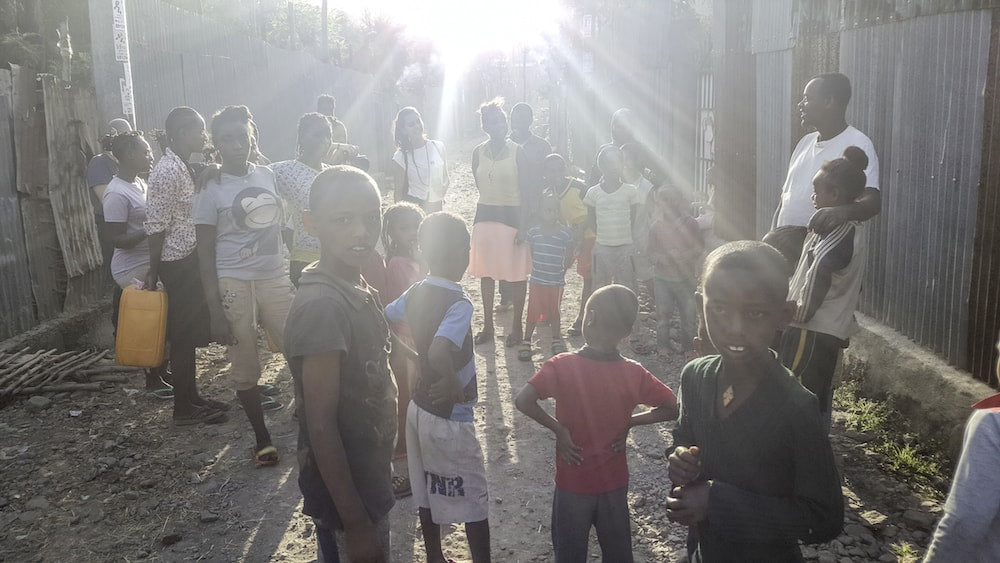 © 2017 PortrAid / Andrea Bury
© 2017 PortrAid / Andrea Bury
Shiferaw, the project manager of Sabahar, and our guide, organiser and translator in one for the next three days was explaining to us that over half of the people living here do not have direct access to drinking water. There were no proper streets, so we left the car and walked. On a big playing field, children played soccer, volleyball or just ran curiously behind these funny looking visitors – us!
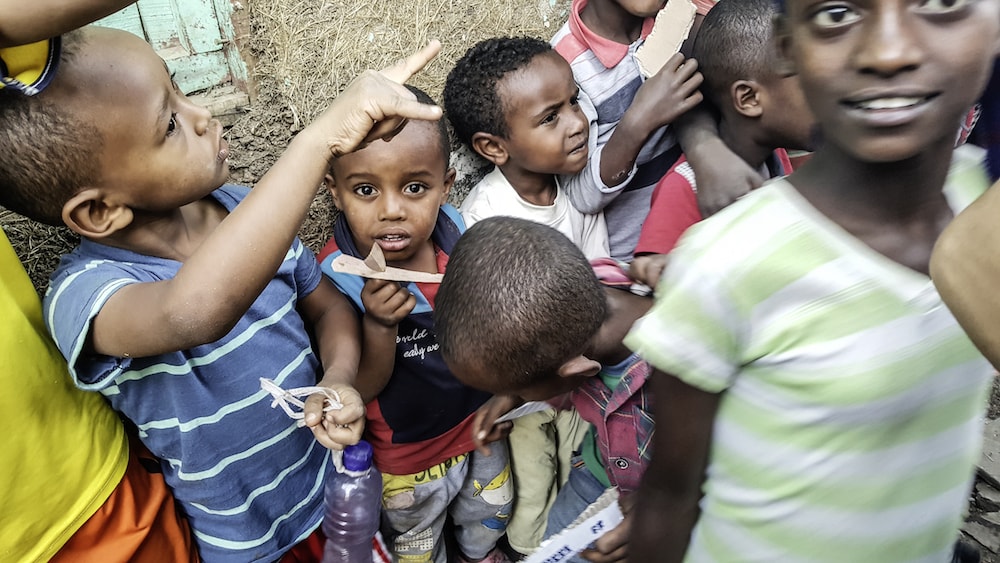 © 2017 PortrAid / Andrea Bury
© 2017 PortrAid / Andrea Bury
A Day in the Lives of the Weavers
Then we entered the first house and Mesenbet Ewunetu approached us with a big smile on his face, proudly presenting his house, wife and children. In the backyard he introduced us to one of his greatest accomplishments: He is an employer and has a small room where some men and women are sitting together, the women spinning the wool, the men weaving. Weaving has a long tradition in Ethiopia. In the past, a loom used to be part of every household. ”If we would have better looms, we could produce so much more and better quality. This could help all of us to more than double the income“, he said.
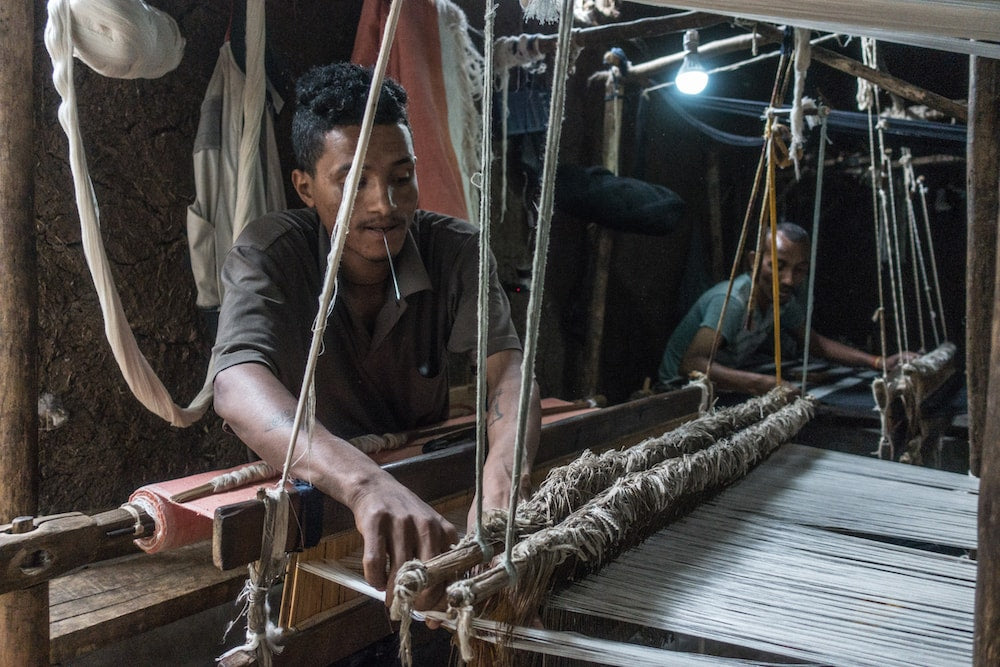
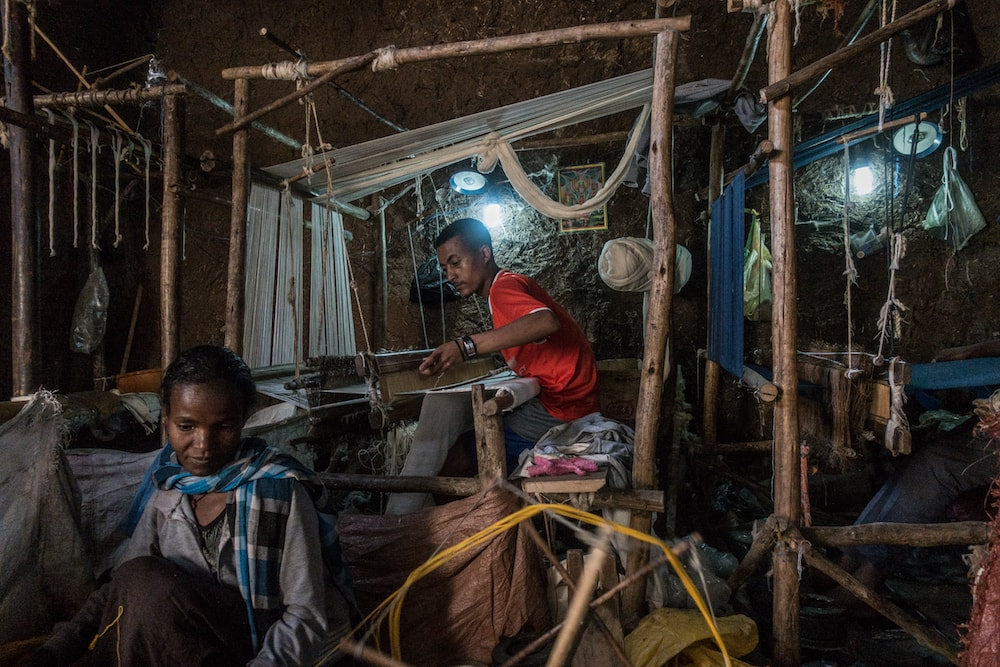 © 2017 PortrAid / Thomas Rusch
© 2017 PortrAid / Thomas Rusch
Some children were running between our feet making fun, while others were hiding behind the mother. All of them wanted to have their photo taken and laugh. After just a few minutes humanity kicked in and we became part of their eco system. One house stood out of all the others: Fully covered by movie posters, and we discovered it was the local cinema, with a timetable outside. A small, dark room with a flat screen - and a bunch of children giggling while watching a kids movie in the afternoon.
We visited more houses, many of them with no access to water supply, just built out of mud and wood - and no waste collection … although just next to „China camp“ there is a big waste incineration plant. The people told us that the year before one of the waste mountains had collapsed and over 100 people had died - who were living there illegally. They said they are privileged that they have a house and are proud of being able to support the family with their work. And you felt it - if you looked into the details - you saw the love that went into it.
African Landscape through a Filter
Then there is also the other side of Ethiopia - the raw nature, beauty, wilderness. As we left Addis Ababa and drove an hour outside to an area called Sululta, which is a wide, shallow valley with an elevation of 2500 meters above sea level, almost completely surrounded by mountains and we learn that the famous runners of Ethiopia come here a lot to practise.
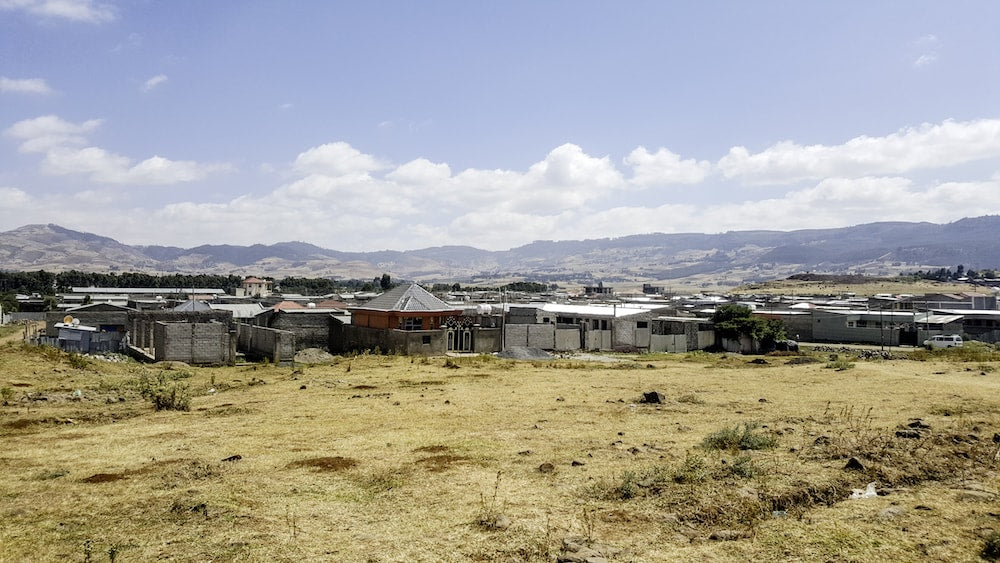 © 2017 PortrAid / Andrea Bury
© 2017 PortrAid / Andrea Bury
Here you really have the feeling of playing a part in „Out of Africa“. That is the landscape you associate with the continent - yellowish, wide surroundings - like if you put a filter on the camera objective. Cows and buffalos on the open fields, kids running around in the wild nature and always some mountains around. An amazing scenery that you can see in the PortrAid photos as well.
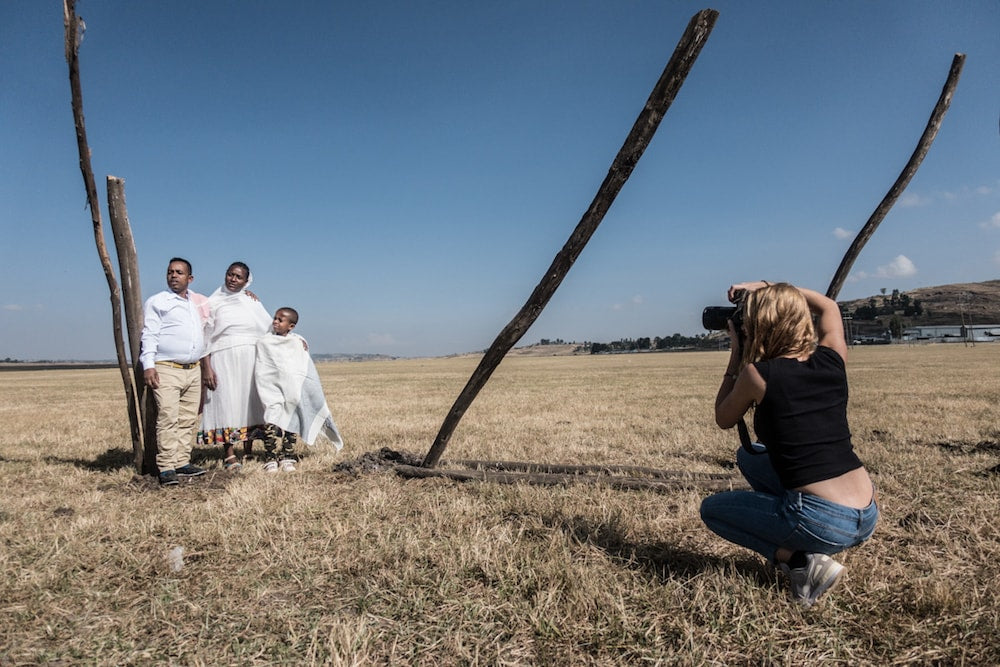 © 2017 PortrAid / Thomas Rusch
© 2017 PortrAid / Thomas Rusch
We stayed for four intense days. The people invited us into their world without hesitation: they were not shy to share their pride and their pain. And so we shared ours as well. We had deep discussions followed by lots of laughter and games and food. I can only recommend everybody to travel and to make these experiences yourself. Respect and humour are two key ingredients that open the way to people’s heart no matter where you are. We felt very privileged to learn so much in such a short time. We will be back - this is for sure - there is so much more to discover!


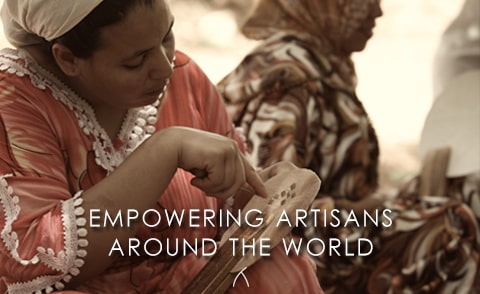
0 comments